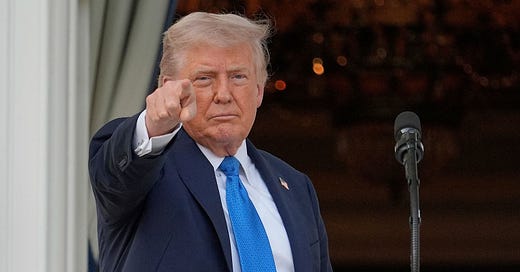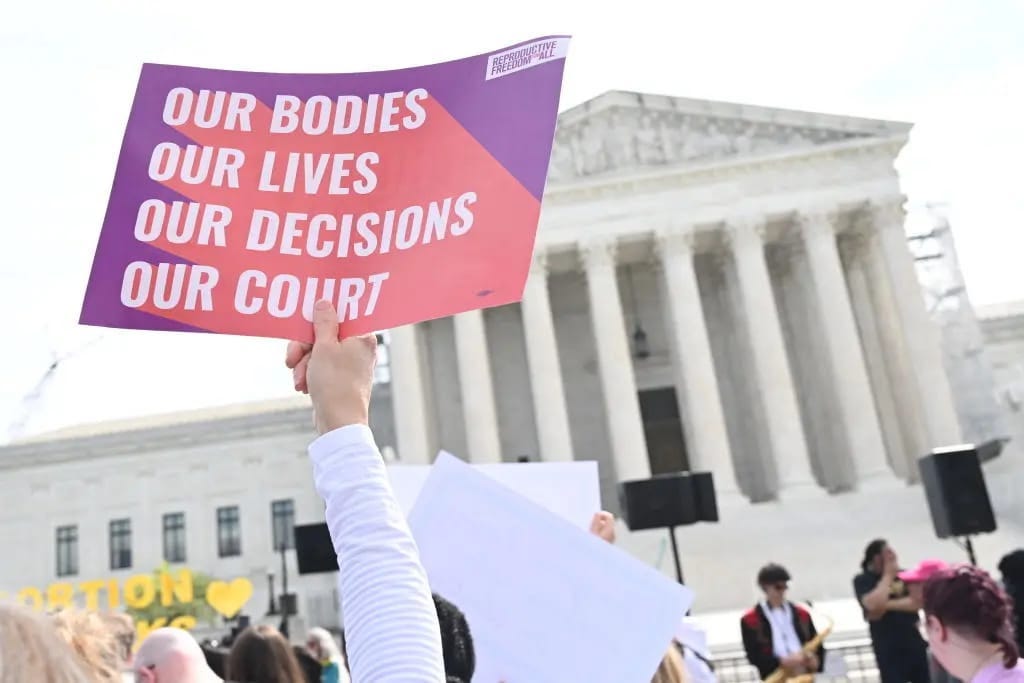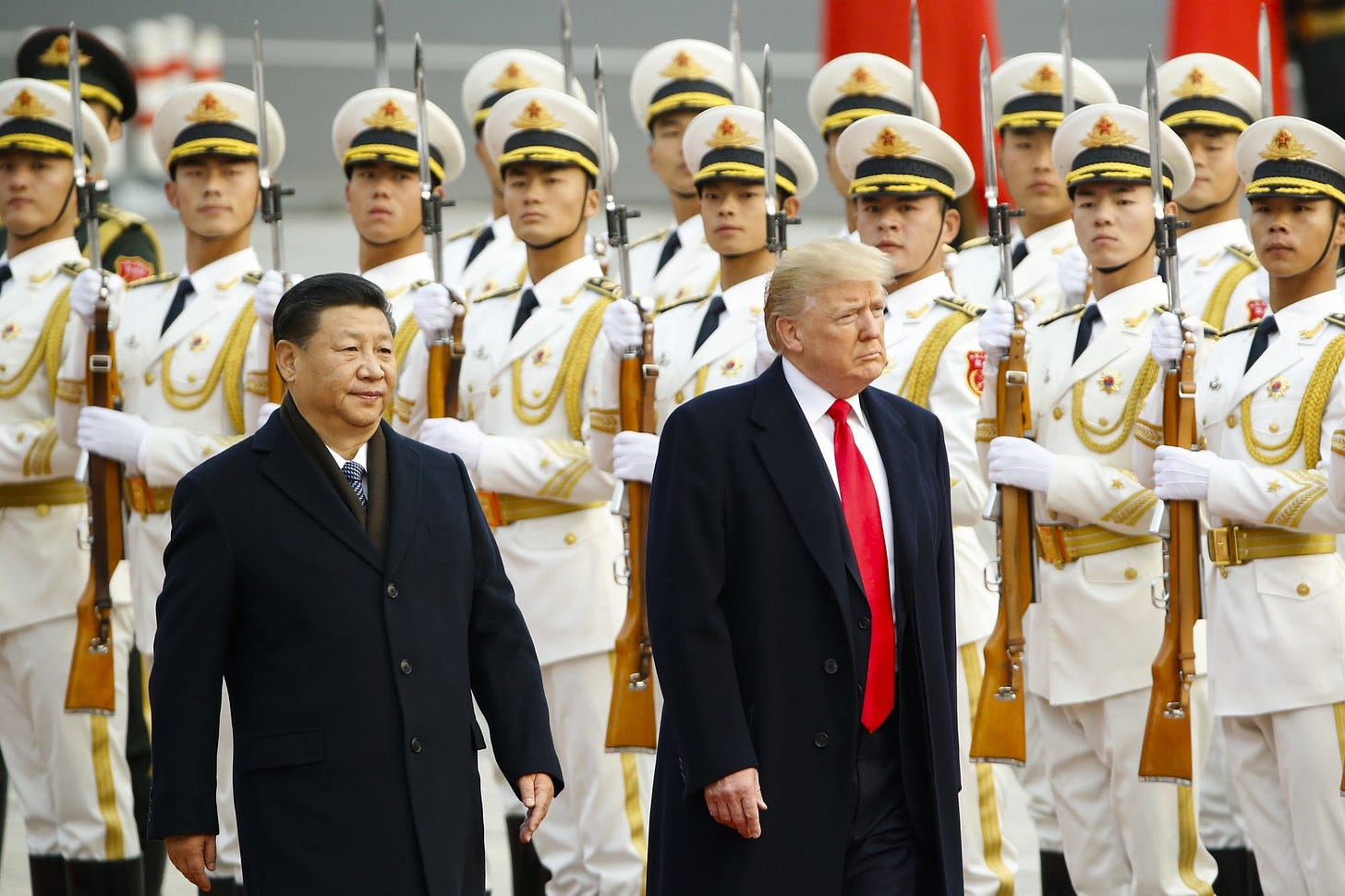Trump signed proclamation to ban travel from several countries, sources say
President Donald Trump gestures after speaking during a summer soiree on the South Lawn of the White House, Wednesday, June 4, 2025, in Washington.
Alex Brandon/AP
CNN —
“Trump signed a proclamation to ban travel from several countries this evening, citing security risks, two sources familiar told CNN.
The ban will fully restrict entry of nationals from 12 countries: Afghanistan; Myanmar, also known as Burma; Chad; Republic of the Congo; Equatorial Guinea; Eritrea; Haiti; Iran; Libya; Somalia; Sudan; and Yemen.
People from seven countries will have partial restriction: Burundi, Cuba, Laos, Sierra Leone, Togo, Turkmenistan and Venezuela.
The proclamation includes exceptions for lawful permanent residents, existing visa holders, certain visa categories and individuals whose entry serves US national interests.
The president made the final call on signing this proclamation after the antisemitic attack in Boulder, Colorado, according to a White House official. He was considering it beforehand, but Sunday’s assault put it into motion faster.” [CNN]
House GOP gets megabill’s official price tag: $2.4T
“Congress’ nonpartisan scorekeeper released its full score Wednesday of the tax and spending package House Republicans passed along party lines last month, predicting that the measure would grow the federal deficit by $2.4 trillion.
It comes days after Elon Musk, freshly departed from serving as chief of the White House Department of Government Efficiency, blasted the measure as ‘massive,’ ‘outrageous’ and ‘a pork-filled disgusting abomination.’
And while top Republican lawmakers are expected to downplay the significance of the complete price tag from the Congressional Budget Office, the numbers will influence what lawmakers are able to include in the final package they are endeavoring to send to President Donald Trump’s desk this summer.
The scorekeeper’s analysis will also be used to determine whether the bill follows the strict rules of the reconciliation process Republicans are using to skirt the Senate filibuster and pass the measure along party lines.
Because Republicans in the Senate are now making changes to the package the House passed two weeks ago, the budget office will need to score the cost of each piece of the new version senators are assembling, followed by another full price tag for the whole package.
Unlike the earlier scores CBO released of the separate chunks of the House bill, the analysis released Wednesday takes into account how policies in one part of the package might influence the budget and economic impacts of others. It also shows that the House-passed legislation would lead to nearly 11 million people going uninsured, with more than 7.8 million of those individuals getting kicked off of Medicaid and millions more losing coverage through the Affordable Care Act marketplace.
The White House has taken aim at the Hill’s nonpartisan scorekeeper, with press secretary Karoline Leavitt alleging that the number-crunchers at CBO are “partisan and political” with a bias toward Democrats. But current CBO director Phillip Swagel served in the George W. Bush administration and has donated to GOP political candidates.
Swagel was first chosen in 2019 for a four-year term and was reappointed in 2023, with a recommendation by now-House Budget Chair Jodey Arrington (R-Texas).
Trump administration to establish its own position on emergency care
“The Trump administration has rescinded a Biden administration policy informing hospitals and doctors that they can provide emergency abortions to stabilize pregnant people, even in states restricting abortions.
The background: In 2022, the Biden administration issued a letter informing hospitals and doctors that the Emergency Medical Treatment and Active Labor Act, or EMTALA, protects ‘your clinical judgment and the action that you take to provide stabilizing medical treatment to your pregnant patients’ — even in states that restricted abortion access.
•What is "emergency care"? This could mean abortion, removal of fallopian tubes or treatments for high blood pressure.
•Now, this 2022 letter has been rescinded. The Trump administration said Biden's guidance and communications on emergency abortions ‘do not reflect the policy of this administration.’
•What does this mean for your pregnancy? The Trump administration says it will continue to enforce EMTALA but take its own stance to ‘rectify any perceived legal confusion and instability created by the former administration’s actions.’” [USA Today]
New Trump-Musk tension
President Trump and Elon Musk speak during an Oval Office press conference last week. Photo: Evan Vucci/AP
“Elon Musk's all-out disdain for President Trump's ‘big, beautiful bill’ is devolving into a cold war between the country's most powerful men — and setting up a major test of Musk's political sway.
Why it matters: Insiders say Musk and Trump remain friends and allies. But Musk's scathing rhetoric — threatening yesterday to ‘fire all politicians who betrayed the American people’ — signals that tension is growing, Axios' Marc Caputo writes.
Musk's post on X calling Trump's legacy legislation a ‘disgusting abomination’ of pork spending blindsided Trump's team when it was posted during a White House press briefing.
His comments gave fresh ammunition to budget hawks in the Senate demanding trillions of dollars of additional spending cuts to vote for the bill — and delighted Democrats searching for another opening to attack Republican infighting.
The big picture: Trump was irked by Musk's social media sabotage, according to two insiders in frequent communication with both.
‘Elon was butthurt,’ one source said of the largest Republican donor of the 2024 cycle.
Between the lines: Republican regrets about the megabill have also erupted in the House, where two members say they want a do-over for parts of the legislation.
Rep. Marjorie Taylor Greene (R-Ga.) said yesterday she hadn't read a section banning states from passing their own AI regulations. Greene said she'd be a ‘no’ on final passage unless the measure is removed.
Rep. Mike Flood (R-Neb.) said last week he hadn't read a section that would make it harder for judges to hold officials in contempt of court. Flood said he'll ask the Senate to remove the passage.” [Axios]
Go deeper: Four reasons Musk attacked Trump's "big beautiful bill."
By Ali Bianco and Eric Bazail-Eimil
A Cuban immigrant advocate wears a button reading in Spanish ‘Migrating is not a crime,’ during a press conference to denounce a recent Supreme Court decision which allows the Trump administration to strip humanitarian parole protection for more than 500,000 immigrants from Cuba, Haiti, Nicaragua, and Venezuela. | Rebecca Blackwell/AP
“POWER OUTAGE — Until Friday, Cuban immigrants occupied a special place in American immigration policy.
From the Mariel boatlift to ‘Wet Foot, Dry Foot’ policy to the sheer transformation of Miami as the so-called capital of Latin America, over the past 60 years Cubans have played a key role in rewriting the rules on immigration — sometimes carving out their own exceptions in U.S. immigration law.
But a Supreme Court majority last Friday may have dealt a lasting blow to the traditionally privileged status of Cuban immigrants. The Trump administration now has the green light to end the Biden-era Cuba, Haiti, Nicaragua and Venezuela (CHNV) parole program and eliminate the legal status of over 500,000 immigrants, including Cubans. Never before have so many Cubans been on the verge of losing status — let alone being deported en masse.
Cubans, via the 1966 Cuban Adjustment Act, have long enjoyed their own specific path to citizenship; after living in the United States for a year, Cubans are fast-tracked towards obtaining permanent residency. And Cubans under that law have been exempted from other provisions of the Immigration and Naturalization Act.
Politicians have tried (and largely failed) to replicate those special protections for other immigrant groups — most recently for Venezuelans. But none of those groups have achieved the political clout and influence needed to secure the kinds of benefits Cubans have enjoyed for nearly six decades under U.S. law.
The Supreme Court’s recent decision allowing the Trump administration to cancel the parole program puts in limbo tens of thousands of Cubans who hadn’t been in the U.S. long enough to qualify for the Cuban Adjustment Act’s protections. That’s in addition to the 40,000 Cubans with deportation orders against them.
It’s not the first time Cubans have seen their unique status in immigration law pared back. In 2017, the Obama administration nixed the Clinton-era ‘Wet Foot, Dry Foot’ policy which granted Cuban refugees who were intercepted on U.S. soil automatic asylum as part of its efforts to reopen diplomatic relations with Havana. And the first Trump administration opted to enforce a deal with Cuba to accept deportation flights from the U.S., even as it reinstated other sanctions and measures against the island’s communist government.
But the scale of the potential deportations now is expansive — and tinged in irony. After helping deliver Florida twice to Trump, Cubans have never had more influence in Washington.
Cuban exile politicians are at the peak of their power. Marco Rubio, the former senator and son of Cuban immigrants, is one of the most influential American diplomats in recent memory, the first individual since Henry Kissinger to hold the national security adviser and secretary of state positions at the same time. On Capitol Hill, Rep. Mario Díaz-Balart (R-Fla.), another Cuban American, is the vice chair of the House Appropriations Committee and wields considerable influence within a narrow GOP House majority over the flow of legislation.
That influence has only magnified with House Republicans’ slim majority. The ‘crazy Cubans’ –– as Speaker Mike Johnson has dubbed Díaz-Balart and his South Florida colleagues Reps. María Elvira Salazar and Carlos Gímenez –– have wielded their influence in concert with Rubio’s policy priorities.
But the Trump administration has been adamant about making good on Trump’s vow of the largest mass deportation in U.S. history — with the White House deputy chief of staff Stephen Miller pressing Immigrations and Customs Enforcement to ramp up arrests to 3,000 a day and Department of Homeland Security Secretary Kristi Noem pushing forward on canceling temporary programs, including CHNV.
Deporting the thousands of Cubans suddenly out of status could go a long way toward reaching the numbers Trump promised on the stump. Only there’s one big problem: Miami’s Cuban voters are overwhelmingly Trump voters.
Florida International University’s Cuba poll released just after the 2024 election showed a staggering 68 percent of Cuban Americans cast their ballots for Trump, nearly twice as many as in 2016.
To cast out Cubans would be political suicide for the GOP and could cost them in the midterms, says Dr. Eduardo Gamarra, a professor and pollster at FIU.
‘Now there are more Republicans than there are Democrats in Miami Dade County, it may have reached its apex,’ Gamarra said, while cautioning that ‘these shifts are not permanent.’
In the wake of the Supreme Court decision, the South Florida Cubans in Congress will attempt to thread the needle between breaking with Trump on deportations and defending the Cuban population that delivered them their political power.
For their part, they are vowing to fight to preserve Cubans’ pathways to citizenship. Diaz-Balart wrote on X shortly after the Supreme Court ruling that they are working with the Trump administration ‘to make the case and find a permanent solution for Cubans, Haitians, Nicaraguans, and Venezuelans who have fled political crises and cannot return to their countries of origin because of legitimate claims of persecution.’
More specifically, the South Florida members are holding out hope they’ll convince the Trump administration to keep the Cuban exception.
‘They need to be treated a little bit differently,’ Gímenez told reporters at a press conference in Miami following the court ruling.
‘They’re a part of our community, they’re part of our economy and they need to be treated as such,’ Gimenez added. ‘So we’re going to be looking for some adjustments to what the enforcement mechanism of this ruling is going to be.’” [POLITICO]
“Confirmation process begins for Trump’s first judicial nominees: The Senate Judiciary Committee is launching the confirmation process for the first judicial nominations of President Donald Trump’s second term. The panel this morning opened a hearing for Whitney D. Hermandorfer, Trump’s nominee for the Sixth Circuit Court of Appeals, and four other district court judges in Missouri: Maria A. Lanahan, Cristian M. Stevens and Zachary M. Bluestone for the Eastern District, and Joshua M. Divine for the Eastern and Western Districts. It is a continuation of a major priority of Trump’s first term: applying a conservative slant across the federal bench. The Senate confirmed hundreds of judges the last time Trump was in office. The Biden administration also confirmed hundreds of judges, leaving relatively few vacancies for Trump to fill upon his return to the White House in January. According to data from the U.S. courts, there are currently about 49 existing vacancies.” [POLITICO]
A surprise drone strike devastated Russia’s air force. The U.S. is vulnerable, too.
“The audacious Ukrainian attacks on Russian airfields showed the power of unconventional, asymmetric warfare — and highlight the threat to U.S. strategic bases and ports, experts say.”
Read more at Washington Post
Federal judge bars Trump administration from deporting family of Boulder attack suspect
“The development came after lawyers for Mohamed Sabry Soliman’s wife and children filed an emergency petition arguing their detentions were illegal. On Tuesday, the Trump administration announced it had detained the family and would deport them immediately.”
Read more at Washington Post
Boulder suspect's daughter dreamed of studying medicine. Now she faces deportation.
“Habiba Soliman moved to the United States with a dream of studying medicine to transform lives. Soliman recently graduated from high school, but her aspirations were upended when her 45-year-old father was charged with a federal hate crime and 16 counts of attempted murder related to the attack in Boulder, Colorado, that left a dozen people burned, including an 88-year-old Holocaust survivor. Two remain hospitalized. Now, Soliman, daughter of Boulder attack suspect Mohamed Sabry Soliman, faces deportation along with the rest of her family.” [USA Today]
“Today, President Trump is doubling tariffs on imported steel and aluminum from 25% to 50%. This is the latest move in the president's trade war, aimed at protecting domestic steel and aluminum workers. However, critics argue that this action will increase costs for businesses and consumers that rely on steel.
Rebecca Droke/Getty Images
H.O. Woltz, who owns a company in North Carolina that twists steel wire into cables for reinforced concrete, says implementing tariffs won’t eliminate the fact that China is driving the whole world market. Woltz tells NPR’s Scott Horsley that he worries tariffs could push the cost of building materials so high that it could put some construction projects on hold. Steel and aluminum are used in many products, from auto parts to cans for soup. They will all be subject to increased taxes. The increases would be passed onto the consumer, which is an unusual strategy for Trump, who campaigned to bring down the cost of groceries, Horsley says.” [NPR]
“The Trump administration yesterday formally requested that Congress rescind the $1.1 billion allocated for public broadcasters over the next two years. This reduction in funding for public broadcasting would have a minimal impact on the $36 trillion national debt, yet it represents the entire funding levels for the Corporation for Public Broadcasting through September 2027. Congress had approved this funding in March as part of a stopgap spending bill that the president signed. By law, Trump's request initiates a 45-day period for Congress to consider it.
This move is part of Trump’s broader clash with cultural institutions, NPR’s Fatma Tanis tells Up First. The president and his allies have accused NPR and PBS of partisan bias. Both organizations are challenging the order in court. NPR CEO Katherine Maher says the administration is punishing public media for coverage it dislikes. In addition to money for public broadcasting, the White House wants to send back money aimed at controlling the spread of diseases like HIV/AIDs, programs related to women’s health and gender issues, and environment and climate change research.” [NPR]
A UN spokesperson has called the GHF a 'pretence of aid'. Credit: Getty Images“The Gaza Humanitarian Foundation, a private U.S. group running food distribution in Gaza, put its operations on hold today after another deadly shooting near its site yesterday. Twenty-seven Palestinians died in the shooting, according to hospitals and health officials in Gaza. Israeli military officials say warning shots were fired by troops near a few individual suspects, but they didn’t fire at crowds. Airstrikes continued overnight in Gaza as Israel expands its military campaign and continues to restrict aid into the enclave.
Health officials say dozens of Palestinians have been killed by Israeli gunfire near the sites nearly every day since the operations began a week ago. Organizers said the pause will help them prepare logistically with the Israeli military to deal with the size of the crowds, as they didn’t expect 15,000 people in an hour yesterday. NPR’s Hadeel Al-Shalchi says it is apparent that the GHF didn’t know how many Palestinians were willing to walk miles for food due to desperation. Palestinians had been under a total aid blockage for nearly three months.” [NPR]
DOGE cuts
“President Trump has asked Congress to sign off on some of the federal spending cuts that the Department of Government Efficiency sought to make unilaterally. The White House request totals $9.4 billion and targets both the Corporation for Public Broadcasting, which funds NPR and PBS, and the US Agency for International Development (USAID). The annual budget of the Corporation for Public Broadcasting is about $535 million — just $1.60 per taxpayer each year. And even though the US has long been the largest provider of humanitarian assistance globally, foreign aid accounts for less than 1% of the US budget. Congressional approval would codify the DOGE cuts into law so that they could not be reversed by the next administration and would help to insulate the Trump administration from legal challenges.” [CNN]
Violent crime prevention
“On the campaign trail, President Trump falsely claimed that violent crime had skyrocketed in the US and that communities were less safe. Although the FBI reported that both violent and property crime had declined during the Biden administration, Trump continued to present a picture of unbridled crime in America. Yet since Trump returned to the White House, his administration has eliminated about $500 million in grants to organizations that bolster public safety, including many working to prevent gun violence. These grant cuts have prompted layoffs and reductions in state- and local-level services around the country, as well as legal proceedings against the Department of Justice.” [CNN]
FBI arrests man who allegedly shipped explosive material to Palm Springs fertility clinic bomber
“Daniel Park, 32, was arrested at John F. Kennedy International Airport in New York. He allegedly traveled to Palm Springs, California, to meet with Guy Bartkus and help plan Bartkus’s May attack on American Reproductive Centers, which injured four and killed Bartkus in what the FBI labeled an intentional act of terrorism.”
Read more at Washington Post
Navy ships
“Secretary of Defense Pete Hegseth has ordered the secretary of the Navy to rename the USNS Harvey Milk. A Navy veteran and gay rights activist, Milk was assassinated while serving on the San Francisco Board of Supervisors in 1978. At the time, he was one of the first openly gay politicians elected to office in the US. The USNS Harvey Milk is part of the John Lewis class of oiler ships that were named after civil rights leaders, which include the USNS Earl Warren, USNS Robert F. Kennedy, USNS Lucy Stone and USNS Sojourner Truth. It’s not yet known if these ships will also be targeted for renaming, although such a move would be in line with Hegseth’s aim of eliminating any diversity, equity and inclusion content in the Defense Department. Chief Pentagon spokesperson Sean Parnell said any decisions to rename other vessels would be announced when internal reviews were complete. ‘Secretary Hegseth is committed to ensuring that the names attached to all DOD installations and assets are reflective of the Commander-in-Chief’s priorities, our nation’s history and the warrior ethos,’ Parnell said.” [CNN]
“Karine Jean-Pierre, the White House press secretary under former President Biden, writes in a forthcoming book that she has left the Democratic Party and is now an independent. "Independent," out Oct. 21, will urge Americans to ‘embrace life as Independents.’” Go deeper. [Axios]
INTERNATIONAL
President Trump described the call as ‘a good conversation, but not a conversation that will lead to immediate peace.’
PHOTO: KEVIN DIETSCH/GETTY IMAGES
Moscow plans to respond to Ukraine’s recent drone attack, President Trump said on social media after his phone call with Russian President Vladimir Putin.
“The retaliation dampens the prospects for immediate peace ( read for free) between the warring countries. Trump didn’t say whether he urged Putin not to launch a retaliatory attack. The U.S. president has repeatedly called for peace, though in recent weeks he has expressed frustration with Moscow. Ukraine’s Sunday drone attack devastated Russia’s bomber fleet. The meticulously planned operation combined homegrown technology with the classic art of deception, a WSJ analysis shows.” [Wall Street Journal]
ICRC chief urges world leaders to act now
The ICRC, an international organisation that operates in war zones, has more than 300 staff in Gaza. Credit: Getty Images
“In April, ICRC president Mirjana Spoljaric called the situation in Gaza ‘hell on Earth’. As she recently visited the territory, Jeremy Bowen asked her if her assessment still stood. ‘It has become worse…’ she said. She described what is happening as ‘surpassing any acceptable, legal, moral and humane standard’, and called on world leaders to act now to save lives. Her words carry moral weight, writes Jeremy, noting that the organisation is considered the custodian of the Geneva Conventions, treaties that form the basis of international humanitarian law meant to regulate the conduct of war.”
Read in full at BBC
“South Korea’s choice of Lee Jae-myung as president closes the door on months of turmoil sparked by his predecessor’s attempt to impose martial law — and opens another to a bold new direction in foreign policy.
Lee’s win in yesterday’s election marks a shift after three years of conservative rule. His first pledges focused on reviving the economy, backed by a proposed $25 billion stimulus plan, which already drew a reaction from markets.
The bigger question is what his presidency means for the key computer-chip manufacturer’s place on the world stage.
WATCH: Shery Ahn reports on Lee’s priorities as president on Bloomberg TV.
In his inauguration speech today, Lee laid out a vision for easing tensions on the Korean Peninsula through dialogue, not confrontation. Restoring communication with Pyongyang will be a priority — a departure from the previous isolation and deterrence strategy.
He reaffirmed South Korea’s commitment to a trilateral partnership with the US and Japan.
But the new leader is also seeking to balance relations with Beijing. That won’t be easy given President Donald Trump’s China wariness and US tariffs looming over South Korea’s export-heavy economy.
The strategy will be tested early. North Korea’s has strengthened military ties with Russia, underscored by a visit to Pyongyang this week by a top security aide to President Vladimir Putin.
An image of a news broadcast showing North Korean leader Kim Jong Un in May 2023. Photographer: Jung Yeon-je/AFP/Getty Images
Lee meanwhile acknowledges the trickiness of dealing with the Trump administration, but says he’s prepared to do what it takes to protect South Korea’s interests.
He’s talked of having ‘a decent number of bargaining chips.’ At the same time, he told CBS with trademark bluntness that he’d ‘crawl through Trump’s legs if needed’ to help his people.
The challenge is to find a path forward that avoids escalation and maintains alliances.
Many will be watching how Lee sets about delivering in a deeply polarized country and fractured world.” — Jasmine Ng [Bloomberg]
Cologne starts its biggest evacuation since 1945 to defuse WWII bombs
“More than 20,000 residents were being evacuated from part of Cologne’s city center on Wednesday as specialists prepared to defuse three unexploded U.S. bombs from World War II that were unearthed earlier this week.” Read More at AP News
“Prospects dimmed of an immediate call between Trump and Xi Jinping after the US president described his Chinese counterpart as ‘very tough’ and ‘extremely hard to make a deal with.’ Chinese Foreign Minister Wang Yi, meanwhile, used his first meeting with the new US ambassador in Beijing to complain about recent actions by Washington, underscoring tensions between the world’s two biggest economies.” [Bloomberg]
Xi and Trump in Beijing in 2017. Photographer: Thomas Peter/Getty Images
“After nearly a month in office and following weeks of negotiations, German Chancellor Friedrich Merz is heading to Washington for talks with Trump and a source says the conservative leader and staunch advocate for close US ties is preparing for all possible outcomes. A positive meeting tomorrow might take some of the heat out of issues such as tariffs and military outlays, but the bigger risk is that tensions could boil over, setting back ties between the US and Europe even further.” [Bloomberg]
“The Netherlands faces months of uncertainty after far-right politician Geert Wilders toppled the ruling coalition. Prime Minister Dick Schoof will likely address that chaos when he speaks to parliament today — though the fact that he is now a caretaker premier means he can no longer tackle any controversial topics.” [Bloomberg]
“Ukraine attacked the Crimean Bridge with explosives as Moscow closed traffic on the route linking the annexed Black Sea peninsula with the Russian mainland.” [Bloomberg]
Locals survey the damage to the Crimean Bridge in Kherson Oblast, Ukraine. Photographer: Security Service of Ukraine/Anadolu/Getty Images
“Iran’s supreme leader, Ayatollah Ali Khamenei, criticized a US proposal for a nuclear deal and called American officials ‘arrogant’ for expecting the Islamic Republic to cease uranium enrichment.” [Bloomberg]
“Ivory Coast’s electoral commission excluded former Credit Suisse CEO Tidjane Thiam from the voters’ roll, closing off his bid to run for president in October.” [Bloomberg]
“Mexico’s new Supreme Court will feature a clear majority of justices with direct ties to the country’s former leftist president or the ruling Morena party he founded.” [Bloomberg]
BUSINESS AND ECONOMY
Some economists are questioning the accuracy of recent and upcoming U.S. inflation data.
“The Bureau of Labor Statistics said staffing shortages forced it to trim the number of businesses where it checks prices. This meant that statisticians had to rely more on a less precise method for tracking price changes in last month’s inflation report, which examined prices in April. There’s no sign of an intentional effort to publish false or misleading stats, but data problems could have major implications for the economy. The BLS and its parent agency, the Labor Department, didn’t respond to requests for comment.” [Wall Street Journal]
TECH
Lawyers using artificial intelligence keep citing fake cases in court.
“It’s a problem: One researcher found 58 AI hallucinations filed in U.S. courts this year, and judges aren’t happy. Humans are hardwired to blindly trust AI — here’s how to fight it.
In other AI news: Some companies, like Duolingo and Meta, are requiring workers to use the tech. Plus, we set a tough reading test for five AI chatbots and found a clear winner.”
Read this story at Washington Post
Lights, camera, Meta! The tech company is turning to Hollywood for exclusive content for a premium VR headset.
“Meta, which plans to release the headset next year, has spoken with entertainment brands including Disney and smaller production companies, according to people familiar with the matter. It’s offering millions of dollars for episodic and stand-alone immersive video based on well-known intellectual property. Meta has previously said it works on many prototypes, not all of which go into production.” [Wall Street Journal]
HIGHER EDUCATION
The Trump administration took aim at Columbia’s accreditation, a significant escalation in its battle with the university.
“The Department of Education told the organization that accredits the Ivy League school that Columbia is in violation of federal antidiscrimination laws and no longer appears to meet the standards for accreditation. The government urged the commission to work with the school to comply with federal law and ‘take appropriate action’ if it fails to do so. Without accreditation, the university would be virtually unable to operate. Neither Columbia nor the accreditation organization immediately responded to a request for comment.” [Wall Street Journal]
Where international students study
Data: NAFSA;; Map: Alex Fitzpatrick/Axios
“California, New York and Texas have the greatest shares of the roughly 1.1 million international college students in the U.S., Axios' Alex Fitzpatrick reports.
Massachusetts and Illinois round out the top five, per data from NAFSA, an international education nonprofit.”
Go deeper. [Axios]
CULTURE
A 200-year-old condom is on display in an Amsterdam museum.
The condom, which dates to 1830, went on display at the Rijksmuseum this week. (Kelly Schenk/AP)
“What’s that? A contraceptive decorated with a racy illustration featuring a nun and three clergymen. It’s thought to be a brothel souvenir, likely made from a sheep’s appendix.” [Washington Post]


















